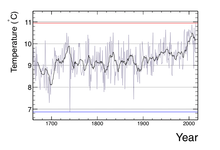
Climate change is impacting the environment and human population of the United Kingdom (UK). The country's climate is becoming warmer, with drier summers and wetter winters. The frequency and intensity of storms, floods, droughts and heatwaves is increasing, and sea level rise is impacting coastal areas. The UK is also a contributor to climate change, having emitted more greenhouse gas per person than the world average. Climate change is having economic impacts on the UK and presents risks to human health and ecosystems.[1]
The government has committed to reducing emissions by 50% of 1990 levels by 2025 and to net zero by 2050.[2][3] In 2020, the UK set a target of 68% reduction in emissions by 2030 in its commitments in the Paris Agreement.[4] The country phased-out coal power in 2024. Parliament passed Acts related to climate change in 2006 and 2008, the latter representing the first time a government legally mandated a reduction in greenhouse gas emissions. The UK Climate Change Programme was established in 2000 and the Climate Change Committee provides policy advice towards mitigation targets. In 2019, Parliament declared a 'climate change emergency'.[5] The UK has been prominent in international cooperation on climate change, including through UN conferences and during its European Union membership.
Climate change has been discussed by British politicians since the late 20th century, but it has attracted greater political, public and media attention in the UK from the 2000s. Public opinion polls show concern amongst the majority of Britons. The British royal family have also prioritised the issue, with King Charles III having been outspoken "about climate change, pollution and deforestation" for the "last 50 years."[6] Various climate change activism initiatives have taken place in the UK.
- ^ "UK Climate Change Risk Assessment 2022". GOV.UK. Archived from the original on 28 August 2022. Retrieved 28 August 2022.
- ^ "Climate Change Act". Climate Change Laws of the World. Grantham Research Institute, Sabin Center for Climate Change Law, Columbia Law School. Archived from the original on 26 April 2021. Retrieved 29 December 2020.
- ^ Shepheard, Marcus (20 April 2020). "UK net zero target". Institute for government. Archived from the original on 26 May 2021. Retrieved 29 December 2020.
- ^ Harvey, Fiona (4 December 2020). "UK vows to outdo other economies with 68% emissions cuts by 2030". The Guardian. Archived from the original on 21 May 2021. Retrieved 27 December 2020.
- ^ "UK Parliament declares climate emergency". 1 May 2019. Archived from the original on 4 February 2020. Retrieved 2 May 2019.
- ^ Osaka, Shannon (13 September 2022). "The many paradoxes of Charles III as 'climate king'". Washington Post. ISSN 0190-8286. Retrieved 23 August 2023.